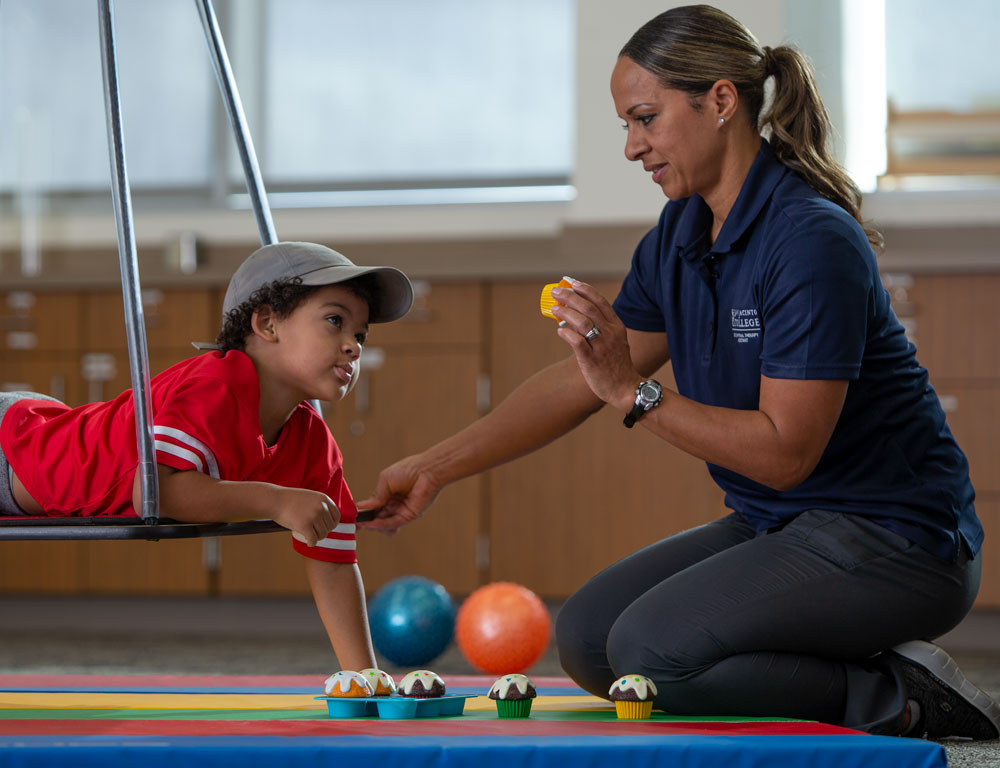
Occupational Therapy Assistant
Are you looking for a career that’s challenging and rewarding? Occupational therapy assistants help patients develop, recover, and improve skills for daily living. Work with young children to older adults. We give you the skills you need to improve lives, one patient at a time.
Program at a Glance
Career Opportunities
- Hospitals
- Pediatric clinics
- Skilled nursing facilities
- Home health
- School systems
Earning Potential
Occupational Therapist Assistant: $72,621
For more salary information, check out Texas Wages.
Location
DEGREES & CERTIFICATES
Occupational Therapy Assistant, AAS
 Play Video
Play Video
Success in Numbers
Program Resources
Our graduates can take the national exam to become certified occupational therapy assistants, given by the National Board for Certification in Occupational Therapy (NBCOT). After passing, they can apply for a state license to work. A felony conviction may affect a graduate’s ability to take the exam or get a license.
Students must finish Level II fieldwork within 18 months after completing the classroom part of the program.
Student Graduation Rates
Student graduation rates are indicated per academic calendar year. Graduation occurs in May of each academic year.
| Graduation Year | Students Entering/Graduating | Graduation Rate |
| 2022 | 12/12 | 100% |
| 2023* | 12/11 | 91.67% |
| 2024* | 12/11 | 91.67% |
| 2025 | 12/TBD | TBD |
| **Total | 36/34 | 94.45% |
*Students withdrew from program due to personal reasons.
** Total students from graduation year 2022-2024.
National Board for Certification in Occupational Therapy (NBCOT) Program Data
National Board for Certification in Occupational Therapy (NBCOT) data results are available on the https://www.nbcot.org/Educators-Folder/SchoolPerformance.
Our graduates can take the national exam to become certified occupational therapy assistants, given by the National Board for Certification in Occupational Therapy (NBCOT). After passing, they can apply for a state license to work. A felony conviction may affect a graduate’s ability to take the exam or get a license.
Students must finish Level II fieldwork within 18 months after completing the classroom part of the program.
Student Graduation Rates
Student graduation rates are indicated per academic calendar year. Graduation occurs in May of each academic year.
| Graduation Year | Students Entering/Graduating | Graduation Rate |
| 2022 | 12/12 | 100% |
| 2023* | 12/11 | 91.67% |
| 2024* | 12/11 | 91.67% |
| 2025 | 12/TBD | TBD |
| **Total | 36/34 | 94.45% |
*Students withdrew from program due to personal reasons.
** Total students from graduation year 2022-2024.
National Board for Certification in Occupational Therapy (NBCOT) Program Data
National Board for Certification in Occupational Therapy (NBCOT) data results are available on the https://www.nbcot.org/Educators-Folder/SchoolPerformance.
Use these resources to better understand the occupational therapy profession and its requirements.
What is occupational therapy? (PDF)
Accreditation Council for Occupational Therapy Education (ACOTE)
American Occupational Therapy Association (AOTA)
National Board of Occupational Therapy Examiners (NBCOT)
Get a sense of what will be required of you during fieldwork sessions.
Academic Fieldwork Coordinator: Christine Joseph, OTD, OTR 281-998-6150 ext. 3949
Weekly Summary Form
FW Educator Self Assessment Tool
Information sessions
Information sessions will be held on a regular basis at our South campus location in building S.1. Want to learn more? Attend an information session.
A Closer Look
Get a better understanding of what OTAs do and the history behind the profession.
Frequently Asked Questions
Check out the admission steps and application here.
Yes. The National Board for Certification in Occupational Therapy (NBCOT) is the exam for becoming a licensed OTA. You can take the exam after you graduate from our program. Once you pass, you can apply for a license to practice through the state agency. In Texas, this is the Texas Board of Occupational Therapy Examiners (TBOTE).
Please note that a felony conviction may affect your ability to take the NBCOT exam or get a state license. You can ask the licensing agency to check your criminal history.
No, the OTA program is only at South Campus. However, you can take the required classes at other campuses, in the evening, or on weekends.
The OTA program is mainly in person. We will only offer online classes or a mix of online and in-person labs if there is an emergency, like a local or national crisis. Students will be notified in advance if there are any changes to the schedule.
No, the OTA program does not offer night classes.
No, observation hours are not required, but they are strongly recommended. The program gives points on the admission rubric for applicants who have spent time observing and learning more about the profession. A good application will include observation hours.
- Inpatient
- Outpatient
- Rehabilitation
- Acute care
- Pediatrics
- Mental health
- Skilled nursing facility
- Home health
Yes, the OTA program admits students from various backgrounds, including those who may have had a previous career.
The OTA program is only offered full-time because of how the courses are planned. The program includes clinical experiences and requires 16 weeks of full-time clinical work at the end of the classroom part of the program.
Many students reapply, and you are encouraged to do so. You will need to fill out a new application with updated documents and mention that you are reapplying. If you completed observation hours within the last two years, you can submit those forms again. Be sure to keep copies of all materials you first submitted so you can resend some documents.
Yes. An applicant who is selected for an on-campus interview will take a health entrance exam at no cost to the applicant on their interview day.
Creating Healthcare Heroes

accreditation
The Occupational Therapy Assistant program at San Jacinto College is accredited by
The Accreditation Council for Occupational Therapy Education (ACOTE) of the American
Occupational Therapy Association (AOTA).
ACOTE
7501 Wisconsin Avenue, Suite 510E
Bethesda, MD 20814.
301-652-6611
accred@aota.org
